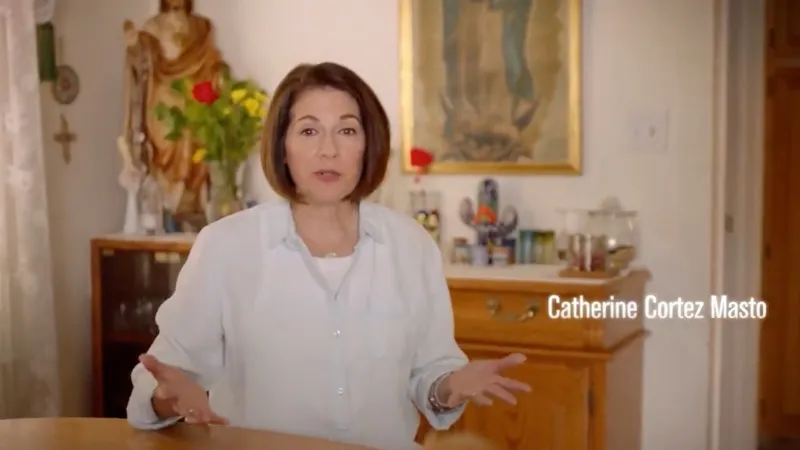
Washington, D.C. Newsroom, Oct 24, 2022 / 12:00 pm (CNA).
One of the closely watched storylines of the Nov. 8 U.S. midterm elections is whether the Republican Party can continue to make inroads with Hispanic voters, many of whom have become disenchanted with the Democratic Party’s focus on abortion and other social policies amid rising inflation, crime, and turmoil at the border.
The key demographic group, which consists of voters of diverse cultures and socioeconomic backgrounds, has traditionally been a reliable source of support for Democrats. But Donald Trump surprised many political pundits by winning 38% of the Hispanic vote in 2020, a significant increase from the 29% he received in 2016.
With an eye toward the next presidential election in 2024, keeping Hispanics in the fold is a top priority for Democrats and their hopes for retaining control of the House and Senate.
But making that happen won’t be easy. As the Wall Street Journal reported, surveys suggest that Republicans will once again win about 34% to 38% of the Hispanic vote.
A majority of U.S. Hispanics were once Catholic, but that number has dwindled in recent years. As recently as 2020, estimates report that anywhere between 40–50% of Hispanics are Catholic today.
More than half of Hispanic Catholic voters (54.7%) surveyed in the latest EWTN News/RealClear Opinion Research poll said they voted for Democrat Joe Biden in the 2020 presidential election. Yet just 45.2% said they planned to vote with the Democratic Party in the midterms, and 44.3% said they plan to vote Republican.
Brian Burch, president of CatholicVote, believes this waning support could prove costly for Democratic candidates this year.
“A majority of these Hispanic voters are Catholic, especially in states like Florida, Texas, Arizona, Nevada, and Colorado where even modest shifts among Hispanic Catholics could flip seats in favor of Republicans,” Burch said.
Another 10.5% of Hispanic voters in the EWTN poll said they were unsure of which way they’ll vote, underscoring the urgency for each party to make their case in the closing weeks of the election season.
Case study: Texas’ 34th congressional district
While Biden received the overall majority of the Hispanic vote in 2020, Trump over-performed in heavily-Hispanic counties, sometimes by wide margins, particularly in rural areas.
In Texas’ Starr County, for example — which is 99% Hispanic — Trump’s performance in 2020 leaped by 55 percentage points from four years earlier.
Trump’s largest shifts in national approval came from Hispanic women. Young Latinas, for example, led the charge in helping the GOP make inroads by door-knocking and serving as party chairs.
Proof of that lies on the ballot this year, which boasts a record number of 43 Latina Republican candidates for the House, tying with Democrats.
In Texas’ 34th district, Republican Rep. Mayra Flores won a special election this year — the first Republican to hold a seat in the southern district since 1870.
Texas’ 34th district encompasses much of Hidalgo County, which is over 90% Hispanic.
Flores, a Mexican immigrant who is married to a border patrol agent, campaigned as a pro-Trump, pro-life conservative. She will face Vincente Gonzalez, who is running as a moderate Democrat, at the polls in November.
Some Hispanics say the shift is happening because the Democratic Party is losing them on certain issues.
Samuel Reyes, who serves as chief of staff for Hidalgo County Democrats, says Hispanic voters are turned off by “radical” policies promoted by Democrats.
“I think that some of the stuff that happened in 2020, the unrest in the nation where some of the more radical parts of the left came up with ‘defund the police’ and some more radical stances, I think kind of turned off some of our voters a little bit. And they were like, ‘Whoah, we don’t want that.’ I think that partly explains the uptick to the Republican side,” he said.
“Down here we have a pretty conservative kind of group of Hispanics. Even the Democrats down here are fairly conservative, and Bible-believing, religious,” he added.
Hidalgo County GOP Chair Hilda Garza said she believes the alignment is happening “because the Republican Party stands for faith, family life, and issues that are important to most Hispanics — work, Second Amendment, and immigration.”
Garza also thinks the availability of Spanish-language news programs has allowed Hispanics to become “more informed” than ever.
“When I was a youngster, we couldn’t come home from school and watch the live VCR or Telemundo. There were no Spanish-speaking TV stations. A lot of Spanish news stations may not be conservative, but they still give information,” she said.
Pocketbook issues resonate with Hispanic voters
As recent polling indicates, pocketbook issues remain the top concern for all Americans heading into the midterms, including Hispanics.
According to EWTN’s poll, the vast majority of Hispanic Catholic voters — 26.1% — said the economy was the most important issue facing the nation. Another 25.2% said inflation was the most important issue. Abortion and immigration were tied for third and fourth place, with only 11.8% of Hispanics saying the issues were the most important in the election.
Other surveys showed similar results. A Washington Post-Ipsos poll released Oct. 14 showed Hispanic voters “rank rising prices as the most important issue in their midterm vote and are split nearly evenly between trusting Democrats and Republicans to address the issue, with more than 1 in 3 trusting neither party.”
The economy’s importance to Hispanic voters seems to be magnified in Nevada’s upcoming Senate race between Democrat Catherine Cortez Masto and Republican Adam Laxalt.
Cortez Masto, the Catholic incumbent, is largely campaigning on abortion rights.
In a controversial campaign ad released Oct. 17, Cortez Masto was seen speaking about her family’s traditional background in front of an image of Our Lady of Guadalupe, the patron saint of the unborn.
Cortez Masto does not support any restrictions on abortion and signed on to Sen. Elizabeth Warren’s legislation to shut down pro-life crisis pregnancy clinics.
Hispanic Democratic activists concede that economic issues are important but are betting that Hispanics will vote pro-abortion.
“I think the top issues are economic,” Ted Pappageorge, secretary-treasurer for Nevada’s Culinary Workers Union, told CNA.
The union — which has 300 paid canvassers across the state — is only endorsing Democrats this year.
Pappageorge said that most of the union’s members “don’t like the idea of having the rights taken away.”
“What we’re seeing is that most folks support a woman’s right to abortion,” he said. “These Republicans in Nevada up and down the board are extremists.”
Silvia Chavez, a Catholic Democrat who canvasses in Las Vegas for the union, believes most Hispanic voters will vote Democrat.
When asked if Cortez Masto’s focus on abortion will prevent religious Hispanics from voting for her, she said she did not think so.
“They’re scared about the economy, prices, and losing insurance,” she said.
Pappageorge also believes Democrats have a “pathway” to win in Nevada even though it remains a battleground.
“This is not a blue state; this is as purple a state could be,” Pappageorge said. “But the way we’ve won is by talking with working-class voters and energizing them to support candidates that really do fight for them.”

Laxalt, a pro-life Catholic, has mainly focused his campaign on pocketbook issues.
Ana Carbonell, a National Republican Senatorial Committee (NRSC) consultant for Hispanic outreach, does not believe abortion will convince Nevadan Hispanics to vote Democrat.
“The extremist view, on the part of the Democrats, is abortion up to the moment of birth,” she said. “Hispanics for the most part, like the majority of Americans, aren’t in the view of extremism.”
Carbonell believes Republicans like Laxalt have an opening to “recapture the messaging” on the American dream, pocketbook issues, and security and stability.
“The Democrats have simply surrendered that message to far-left extremists in their party,” she said.
Meanwhile, the NRSC’s initiative targeting Hispanic voters, Operación Vamos, has ramped up outreach in Nevada.
Juan Arias, an NRSC press secretary, told CNA that the initiative has identified over 250,000 “persuadable Democrat and GOP-leaning Latinos” in the state, a margin he says would swing the election to the right.
Hispanics will account for about 20% of Nevada’s battleground electorate. Recent polls show the Laxalt/Cortez Masto race continuing to tighten and the governor race as a toss-up.
How important is immigration to Hispanic voters?
Importantly, Hispanic voters encompass a variety of demographics representing political views across the spectrum. Cuban voters are far more politically conservative than Puerto Ricans, for example.
It’s not as simple as assuming that Hispanics speak with one coherent voice on every issue, including immigration.
EWTN’s poll, for example, found that immigration ranked in a much lower tier of issues than economic ones did for Hispanics heading into the election. Only 11.8% of respondents cited immigration to be the most important issue, compared with over 50% who cited economic concerns.
“I think most of us believe in having a secure border,” said Reyes, chief of staff for Hidalgo County Democrats.
Hidalgo County borders Mexico and is overwhelmingly Hispanic.
“Our position as Democrats is that if you’re hardworking, law-abiding, you’re trying to just better your family and situation, you’re ready to work, you’re ready to contribute, then you should be able to adjust and become a citizen,” Reyes said.
“The quicker we get all of these people legit and legal, it’s healthier for everyone. These families are part of our society. If we keep on trying to keep them in the shadows, it’s not going to help anyone, and we need to give them a legal way to become citizens,” Reyes added.
Pam Kirby, executive director of the Arizona GOP and former Latinos for Trump adviser, said she believes Republicans “don’t need to change their messaging” on immigration to reach Hispanics.
“We’ve known for a long time in Arizona that Hispanics have conservative values, they share the Republican values. It’s just a matter of having that conversation with them,” she told CNA.
The RNC’s two Hispanic community centers in Tucson and Phoenix have been heavily involved in outreach for the state’s gubernatorial race between Republican Kari Lake and Democrat Katie Hobbs, and the Senate race between Republican Blake Masters and Democratic Sen. Mark Kelly.
“I can’t even tell you how many times Blake and Kari have been to those community centers,” Kirby said. “It’s because their message resonates with the Hispanic community.”
According to recent polls, Lake has a strong lead, including among independent voters. Kelly remains ahead, 51% to Masters’ 48%.
What’s certain is that the Hispanic vote — and the issues that matter to Hispanic voters — will play a major role in the future of both parties. Pew Research projects that if the current Hispanic population continues to grow at its current rate, 22 million residents will be added to the United States by 2050 — a 52% increase.
If you value the news and views Catholic World Report provides, please consider donating to support our efforts. Your contribution will help us continue to make CWR available to all readers worldwide for free, without a subscription. Thank you for your generosity!
Click here for more information on donating to CWR. Click here to sign up for our newsletter.




Leave a Reply